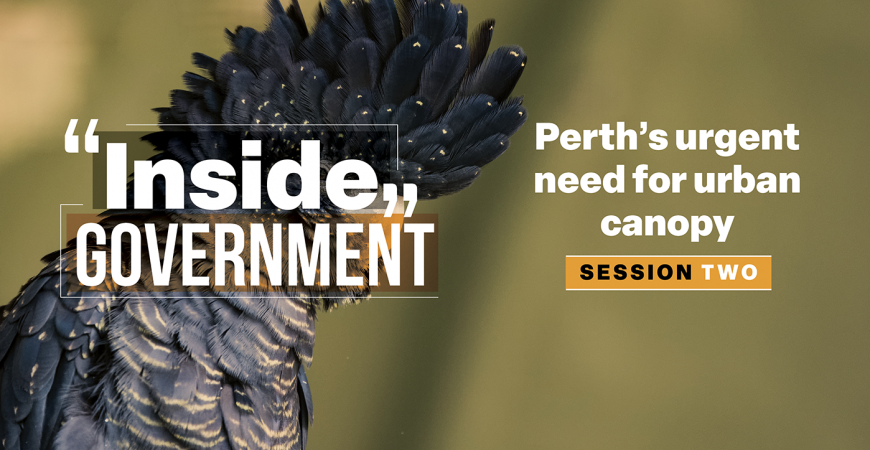This summer has been the second hottest in Perth on record. Forecasts indicate that this should now be considered the new normal.
As we move into March, the traditional months of summer might be over, but for those in the Perth metropolitan area, the prolonged warm and dry conditions are likely to continue. As temperature records tumble, Perth’s residents find themselves in a continued cycle of rushing between air conditioned houses, workplaces and cars. A shady spot under a tree won’t provide much reprieve from temperatures above 40 degrees – if a suitable tree can be found at all.
With oppressive heat and Perth’s urban sprawl resulting in the decrease of urban tree canopy, another pattern is emerging as a new normal. Heat islands are morphing into veritable heat continents, posing threats to biodiversity values across the Swan Coastal Plain and adding pressure to already threatened species like Black Cockatoos. At the heart of Perth's struggle lies its dwindling urban canopy, leaving its residents vulnerable to the harsh realities of climate change.
Perth has the least tree canopy coverage of any Australian capital city at less than 20 per cent. Along with an existing hot and tough climate, the city stands exposed to the full brunt of rising temperatures. Heat islands, once confined to urban centres, are now evolving into larger pockets that envelop suburbs and the peri-urban fringe, exacerbating the already sweltering conditions. The need for tree canopy and native vegetation has never been more pressing.
Benefits of urban canopy
ReGen Strategic has been working with governments, developers and NGOs to understand the pressing need for workable urban canopy strategies. Urban canopy efforts are emerging as a useful tool in climate resilience and a valuable partnership pathway between government, private or non-for-profit entities.
By planting trees and creating green spaces, cities can mitigate the impact of rising temperatures, reduce energy consumption and improve general community wellbeing.
There are economic benefits as well. In aggregate, these efforts reduce the reliance on the metropolitan area to sprint between air-conditioned homes, workplaces and cars. At a local level, the ability to increase green tree canopy is one of the more practical ways to increase the value of a property.
Urban tree canopy in Perth
Perth's local governments have recently been in the news exploring individual strategies to protect or preserve existing trees that provide urban canopy within their local jurisdictions. The ad-hoc approach does not appear to be the preference of the WA Government.
Through our engagement with key decision makers within government, the Stakeholder Engagement team at ReGen Strategic understand that the WA Government wants to balance the need of housing supply pressures and that a centralised, coordinated and scalable strategy to address urban canopy concerns.
This is a preferable method to picking fights over one large tree, or unworkable protection measures on private property.
The WA Government recently released its draft urban greening strategy for Perth and Peel, which is expected to be finalised by the end of 2024. While the strategy is a work in progress, planning is already underway, acknowledging the urgency of the situation. Quietly, the WA Government recognises that tackling this issue requires a concerted effort from all stakeholders. The scale of the challenge ahead is immense, and it's clear that the government will need to leverage every available tool at its disposal.
However, addressing Perth's urban canopy demands goes beyond environmental stewardship; it's also a matter of sustainability in our local communities. Urban greening initiatives have the potential to enhance community well-being and participation. Carbon Positive Australia in partnership with Dr Grey Coupland from the Harry Butler Institute, Murdoch University are leading the way with Miyawaki Pocket Forests, in particular in schools, where greening initiatives link with education outcomes and community wellbeing. As investors and consumers increasingly prioritise ESG, urban greening strategies can align with ESG frameworks, attracting investment and enhancing the reputations of developers, investors and LGAs as a sustainability leader.
The path forward will not be easy, and it will require collaboration, innovation, and sustained commitment. Governments of all levels, businesses, community organisations, and residents must come together to plant the seeds of change and nurture them into flourishing green spaces.
 ReGen Strategic
ReGen Strategic